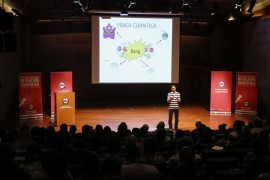- Fecha(s): 04/10/2022
- Lugar: Instituto Centro de Investigación Operativa (Universidad Miguel Hernández). Se grabará.
- Ponente: Marc Escrihuela, Universidad de las Islas Baleares (UIB)

In many economically relevant situations, the outcome of a negotiation determines not only how the two parties share the surplus generated by their interaction (share effect), but also the aggregate surplus (size effect). We show that, in multilateral negotiations modeled using the Nash-in-Nash solution, the equilibrium payoff of a party may be decreasing in her…
- Fecha(s): 16/06/2022
- Lugar: Universidad de Murcia - Departamento de Fundamentos del Análisis Económico
- Ponente: Debrah Meloso

We use high-performance Continuous Double Auction trading software and algorithms to study the effects of algorithmic trading on pricing and allocative efficiency in a laboratory environment. In addition to trading manually, participants can deploy algorithms that bid marginal valuations modulo a spread and a market-making (maker) or liquidity-taking (taker) parameter. The spread and maker/taker parameters…
- Fecha(s): 30/05/2022
- Lugar: Instituto Centro de Investigación Operativa (Universidad Miguel Hernández). Se grabará.
- Ponente: Agustí Segarra Blasco

La investigación científica y la divulgación, esto es poner al alcance de un público más amplio son dos caras de una misma moneda, pero no es lo mismo. Entre los científicos y también entre los economistas encontramos a grandes investigadores que con el paso de los años también se han convertido en divulgadores muy populares…
- Fecha(s): 09/03/2022
- Lugar: Sala Seminarios CIO (Se grabará).
- Ponente: Juan Carlos Gonçalves (UMH-Ayuda Margarita Salas).

Project management is an important body of knowledge and practices that comprises the planning, organization and control of resources to achieve one or more pre-determined objectives. In this presentation, we introduce ProjectManagement, a new R package that provides the necessary tools to manage projects in a broad sense, and illustrate its use by examples. We…
- Fecha(s): 14/06/2021
- Lugar: Seminarios online CIO: http://cio.edu.umh.es/seminariosonline/
- Ponente: Ricardo Martínez, Universidad de Granada

We consider the problem of randomly allocating indivisible units of a resource among agents with conflicting claims on the resource. In the two-agent case, we characterize three focal rules combining axioms reflecting principles of compensation and sacrifice: probabilistic uniform awards, probabilistic uniform losses and probabilistic concede-and-divide. In the general case of n agents, the two…
- Fecha(s): 04/05/2021
- Lugar: Seminarios online CIO: http://cio.edu.umh.es/seminariosonline/
- Ponente: Juan D. Ternero, Universidad Pablo de Olavide

We take the axiomatic approach to uncover the structure of the revenue-sharing problem from broadcasting sports leagues. Our starting point is to explore the implications of three basic axioms: additivity, order preservation and weak upper bound. We show that the combination of these axioms characterizes a large family of rules, which is made of compromises…
- Fecha(s): 13/04/2021
- Lugar: Seminarios online CIO: http://cio.edu.umh.es/seminariosonline/
- Ponente: Joaquin Sanchez Soriano, Centro de Investigación Operativa, UMH

Un problema de atribución consiste simplemente en determinar cuál es la relevancia de una serie de factores para la consecución de un objetivo particular. Aunque la formulación del problema parece sencilla, no lo es tanto, y por ello existe toda una literatura sobre este problema en muy diversos campos. Por ejemplo, este tipo de problemas…
- Fecha(s): 30/11/2020
- Lugar: Seminarios online CIO: meet.google.com/tiy-qjcj-wfo
- Ponente: Francesco Ciardiello, Management School, Sheffield University, UK

This paper develops a duopolistic discounted marketing model with linear advertising costs and advertised prices for mature markets still in expansion. Generic and predatory advertising effects are combined together in the model. We characterize a class of advertising models with some lowered production costs. For such a class of models, advertising investments have a no-free-riding…
- Fecha(s): 03/11/2020
- Lugar: Seminarios online CIO: meet.google.com/hnj-bdpz-rft
- Ponente: David Ríos, Real Academia de Ciencias

Adversarial Machine Learning (AML) is emerging as a major field aimed at the protection of automated ML systems against security threats. The majority of work in this area has built upon a game-theoretic framework by modelling a conflict between an attacker and a defender. After reviewing game-theoretic approaches to AML, we discuss the benefits that…
- Fecha(s): 13/07/2020
- Lugar: SEMINARIOS ONLINE CIO (UMH): http://cio.edu.umh.es/seminariosonline/ (Se grabará)
- Ponente: Marina Segura (Universidad Complutense de Madrid)

La gestión de proveedores es un área estratégica de la cadena de suministro, que debe integrar tanto la homologación y selección como el seguimiento y segmentación de proveedores. El objetivo es identificar las relaciones más adecuadas entre la empresa y sus proveedores. La naturaleza multicriterio de la evaluación de proveedores, que debe tener en cuenta…











